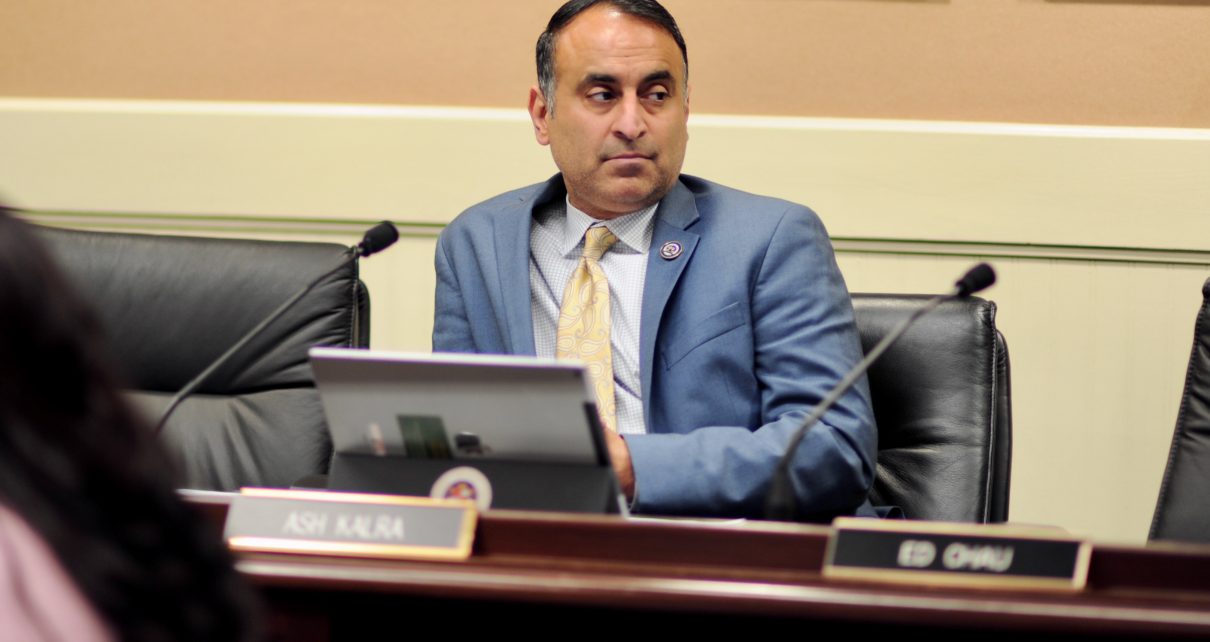
Assemblyman Ash Kalra. (Photo: Kevin Sanders for California Globe)
New ‘Worker Metrics’ Bill Creates ‘Social Compact’ with California Workers
AB 1192 would apply to private-sector enterprises with 1,000 or more employees in California
By Chris Micheli, March 20, 2021 8:54 am
On March 18, Assemblyman Ash Kalra (D-San Jose) amended his Assembly Bill 1192 to create a worker metrics program. The bill would add Chapter 6 (commencing with Section 1415) to Part 4 of Division 2 of the Labor Code.
Section One of the bill would adopt nine legislative findings and declarations that establishing data-drive programs will incentivize exemplary behavior by businesses and create a new social compact with California workers. It is the intent of the Legislature, in enacting this Act, to highlight and reward those companies that are taking good care of their workers. Also, workers have a clear interest in having access to this data and seeing how companies treat their employees according to a set of objective measures.
In addition, the bill specifies that the goals of rewarding exemplary employers, of encouraging improvement by those that are lagging behind, and of serving a broader public interest by mandating the disclosure of essential worker-related data can best be met by the following:
- Having the state collect relevant worker-related data from large employers.
- Making public the data of each individual company.
- Putting the data in context by also calculating and making public industry averages or other benchmarks.
- Using the data that is collected to establish and administer a program, under which qualifying companies will be entitled to certain benefits from the state.
Section Two of the bill would add Chapter 6 to the Labor Code, which would be titled “Worker Metrics Program.” The bill would define the terms “agency,” “employer,” “company,” “firm,” and “worker-related statistics.” It would apply to private-sector enterprises with 1,000 or more employees in California that hires and pays people. It would not apply to a public agency or nonprofit corporations.
The bill would establish a program for the disclosure of worker-related metrics in the Labor and Workforce Development Agency, which would be administered by the Agency. Moreover, the bill expresses the intent of the Legislature to establish a certification program to provide incentives, including as procurement contracts, tax benefits, and workforce development funding, as identified by the Labor Agency, to companies that qualify as high road employers under the disclosure of worker-related statistics as classified by industry.
The Agency would be required to collect annually from employers a set of worker-related statistics. On or before March 31, 2023, and annually on or before March 31 each year thereafter, an employer would be required to submit to the Labor Agency the following worker-related statistics covering the size of the employer’s workforce for the prior calendar year, including:
- Full-time workers in the United States.
- Part-time workers in the United States.
- Hourly workers in the United States.
- Salaried workers in the United States.
- Number of workers in California.
In addition, an employer would be required to submit to the Labor Agency the following worker-related statistics covering the treatment of the company’s workforce for the prior calendar year:
- Pay, which shall include:
- Median pay for all workers in the United States.
- Percentage of full-time workers earning above the United States living wage.
- Hours, which shall include:
- Median weekly hours for full-time workers.
- Median weekly hours for part-time workers.
- Scheduling, which shall include:
- Median number of days of advance notice with which work schedules are first published for both full- and part-time workers.
- Median volatility in weekly hours for workers for both full- and part-time workers.
- Percentage of salaried managerial positions filled by internal promotion.
- Benefits, which shall include:
- Percentage of workers below the median for pay who participate in company-provided health coverage.
- Company contributions made to all employee retirement plans as a percentage of total payroll.
- Percentage of workers below the median for pay who are offered a minimum of 12 weeks of short-term disability insurance or paid medical leave.
- Percentage of workers below the median for pay who are offered a minimum of 12 weeks of paid parental leave.
- Percentage of workers below the median for pay who are offered a minimum of 12 weeks of paid caregiving leave.
- Ratio of nonsupervisory employees to engaged independent contractors and temporary workers.
- Safety, which shall include:
- Total recordable case rate of injuries and illnesses across all United States facilities.
- Total number of fatalities at all United States facilities.
- Annual turnover rate among all workers who joined the company within the past year.
- Equity, which shall include:
- Ratio of median pay for White non-Hispanic males to White non-Hispanic females, Hispanic males and females, Black males and females, Asian and Pacific Islander males and females, and Native American and Alaska Native males and females.
- Percentage of salaried managerial positions held by White non-Hispanic males, White non-Hispanic females, Hispanic males and females, Black males and females, Asian and Pacific Islander males and females, and Native American and Alaska Native males and females.
The bill would also require the Labor Agency to publish guidelines to assist employers in providing the worker-related statistics required, including definitions of terms and formulas for calculating the information that is required. Thereafter, the Labor Agency would have to produce a report form that includes a section for employers, if they so choose, to provide clarifying remarks regarding any of the information provided. The information would have to be provided in electronic format.
In addition, the electronic records would have to be accompanied by a statement by the chief executive of the employer provided under penalty of perjury that attests that all of the worker-related statistics being reported are true, correct, and complete to the best of the executive’s knowledge and belief. After worker-related statistics are collected, the Labor Agency would be required to assign each employer to one of the 24 industries in the Global Industry Classification Standard system.
Finally, upon request of the Labor Agency, the Employment Development Department would be required to provide the Labor Agency with the names and addresses of all employers to which this chapter applies in order to ensure compliance. And, on or before June 30, 2023, and on or before June 30 of each year thereafter, the Labor Agency would have to publish on its internet website all worker-related statistics submitted by all employers, classified by industry.
- Proration of Estate Taxes - February 28, 2026
- Corporations Commissioner Powers - February 27, 2026
- Death Deeds in California - February 27, 2026





Leave it to the DemocRATS to make CA’s 50th ranking in the best states to do business in, get even worse. Stupid and irrelevant statistics about race in the workforce is theater for virtuosity, and does NOTHING to provide businesses with incentives to be in CA. DemocRATS DESTROY EVERYTHING THEY TOUCH. And those voting for them are suicidal.
Chumps
They need the color of your shorts, get over it. Everything is critical, chaos, Alinsky-ed…..
Thankfully, I don’t believe this idiotic bill will pass. Democrats redefined gender. Changing your gender is easier than changing your underwear.
Hear that???
It’s the sound of corporate moving vans starting their engines to relocate California businesses OUT OF STATE to places that do not saddle businesses with such frivolities…
See? It’s another Bay Area liberal, creating social justice legislation and virtue-sognaling the “woke” crowd…
More evidence why the Bay Area is a lunatic asylum and why their politicians should be limited to inflicting their bad ideas on themselves and their constituents, and LEAVE THE REST OF US ALONE!!!
We elect these people to run the state but not into the ground doing a nose dive. WTF? Perhaps they should concentrate and focus on existing dysfunctional agencies before saddling said agencies with more work. However if implemented it should apply to non-profits (especially those affiliated with politicians) and state agencies too, it’s the transparent way.
This is about government micro managing to mandate “woke” company policies. In other words government enforced (at your cost) INSANITY.
Leave the state and do business where you are wanted.
Yep, another job killer!